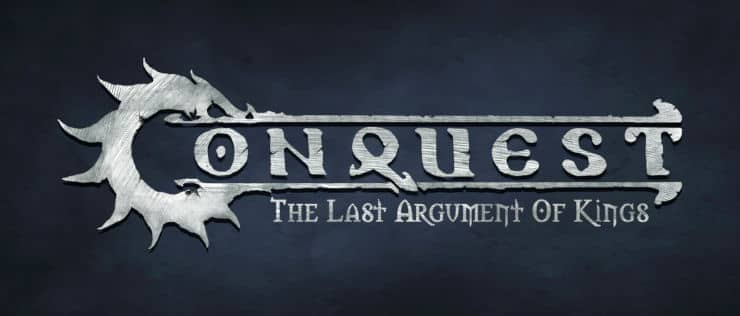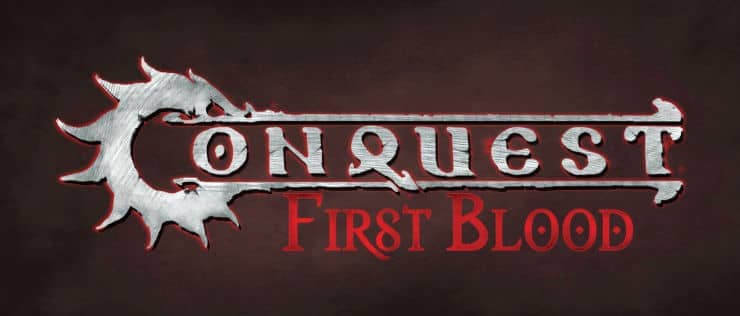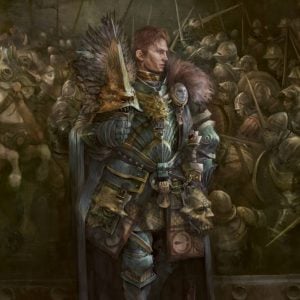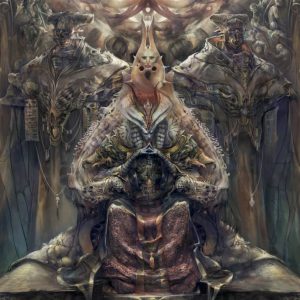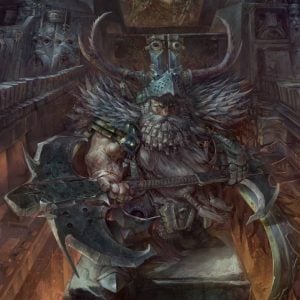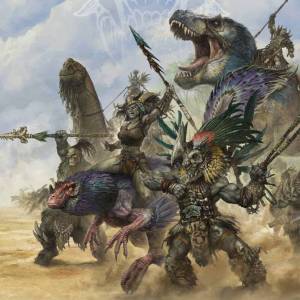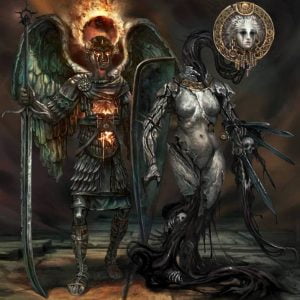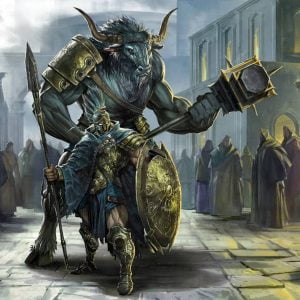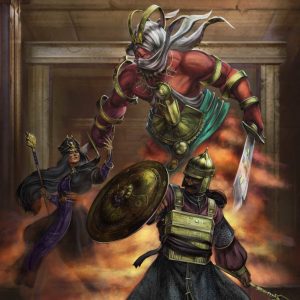
Sovereign of Interference
by Anonymous
[…]
It is no coincidence that many Dweghom Holds suffered a series of tumultuous and
bloody changes in their regimes at the time of Charles Armatellum’s early career. It must
be considered as part of the principal reality of the Dweghom existence; radical changes
in the world were always resonating on Dweghom hearts, their primordial predisposition
making them much more sensitive to any disturbance to the balances (or imbalances) of
Eä. Ghe’Domn nearly reached its own self-desruction at that time, its various clans
locked in a war that rarely had an equal and laid the foundation for the departure of
three clans, a scant few centuries later. Gholond’s Raegh was violently dethroned – an
event not remarkable in itself, but made so by the fact that he was killed by a
Mnemancer Initiate. The Three-of-Kin, Aul’Domn, Orobdhuo and Uosiega, rekindled
their ages-all differences for… a rock, and clashed en masse, albeit the war was quickly
contained.
It is also no coincidence that many small Dweghom warbands marched to the surface at
the time – which was conveniently forgotten by most humans. The reason? Charles
suffered one of the few defeats of his recorded life by such a force from Enurek, which
almost jeopardized his entire campaign against the City States, as they blocked the
passages through the western Albinae. His loss was a blessing in disguise – after all,
Charles was a more learned man than most and he was always being properly advised –
for a victory over the Dweghom could have started a chain reaction of challenges against
this human. Some also attribute the direct involvement of Svarthgalm as well as the
increased aggression of the Nords to Charles’ rise. This is true but only indirectly so;
unlike Charles, Svarthgalm was naturally predisposed to march in the opposite direction
of any sage advice he was being offered.
But unlike the Nords and the Dweghom, there was another force that turned its eyes to
this young King already at that time; one much more focused, dangerous and cunning. In
the scattered Spires around the world, an increased number of licenses to Merchant
Princes would be issued just as a young Charles was solidifying his rule in the newly
founded Austersia.
This, of course, raises multiple questions. Could anyone, the Sovereign included, have
predicted so early the future of Charles Martell? He was not, after all, the only human
king or queen to exploit a volatile situation to expand the borders of their influence.
While, granted, Charles’ success was promising to be unprecedented, the Sovereign’s
reaction would seem too immediate to the very hint of Charles’ greatness. Considering
the volatility of the times, with the Kingdoms boiling in the cauldron of the Red Years,
one man’s successes seem hardly worthy of the Sovereign’s attention, while leaving little
room for certainty of predictions, even to such as capable as he. This leaves two possible
interpretations.
Coincidence cannot be readily dismissed. The intricacies of the Spire politics elude
history’s records and one could safely assume that, much like the Kingdoms, Nords and
Dweghom experienced unrest at the time, so did the Spires. The Sovereign’s decision to
increase the number of licenses could very well be a reaction to internal agitations, or
even to some challenge. It is conceivable, therefore, that the Sovereign’s decision was
irrelevant at the time and simply overlapped another significant event.
That being said, it is hard to imagine that the Sovereign did not thoroughly understand
how his people would infiltrate human society as a direct result of such licenses and the
timing seems too opportune to be coincidental. While undoubtedly the absence of a
“divine” being such as Hazlia diminished the possible threat, the Exiles had every interest
to remain informed about the affairs of a unified human dominion. At the same time,
however, was there really even a hint of such a unification at the time, even to the most
imaginative and cunning eyes? While this seems to suggest that the theory of
coincidence should be considered prevalent, one cannot but wonder if this indeed was
the Sovereign reacting; not to a possibility of the future, however, but to the revelation
of weaknesses in his own machinations.
The key to this theory is location. Charles’ early exploits were taking place far from the
influence of Spires; the closest Spire was the Thurible and, considering the mobility of
Enurek, it is hard to imagine that the Spire would not concentrate more on that much
more immediate threat – the destruction of the Exile Campaign, after all, was too recent
by Exile standards. Speaking of the Thurible, if one accepted that the Sovereign had been
long monitoring human exploits, one would presume that a new faith advocating
unification under one creed would have been much more alarming – but the Thurible
offered insight into its limitations. Charles’ exploits, however, far from the confines of his
subjects’ Spires, revealed that his eyes and ears were limited. There were blind spots in
his web of observation and the Sovereign would not abide this. If it was no coincidence,
therefore, the increase of licenses reflected not the Sovereign’s unparalleled foresight
nor a reaction to Charles himself. It was an acknowledgement and correction of faults, a
recognition of the fact that the Sovereign knew too little rather than more than the rest
of the world.
Both above theories, must be noted, are the optimistic scenarios. A more dire theory,
connected to the second one, would suggest that it was not limited means of
observation that irked the Sovereign; it was lack of tools of interference. Johanna of Lor
was inexplicably burned in her own tent, before she finished her conquer of Galania
during the War of the Lilies. Willhelm of Haubach was killed in combat conquering
Riismark, yet none came forward to be rewarded for the deed. Piotr the Grand was shot
during a hunt, right at the dawn of his campaign to unite the three Principalities. A
suspicious mind would dare imagine the unimaginable…
Surely, this is purely speculation. After all, Charles’ rise to power, and the continuation
and expansion of his legacy by his House, was never halted or even impeded by the
actions of the Spires – save, perhaps, for history’s large question mark hanging over Otto
IV’s assassination, nearly three centuries later. […]

